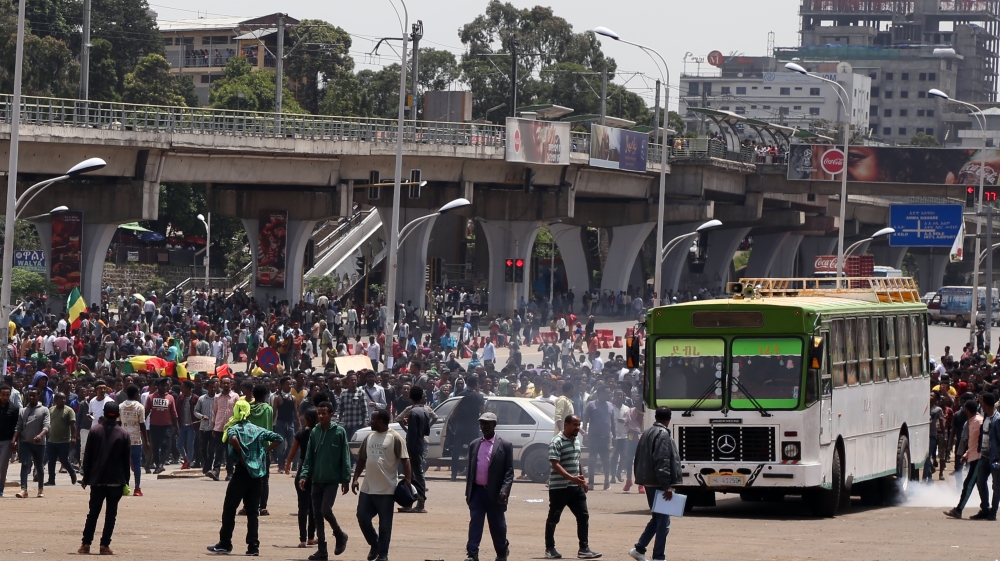
Thousands of protestors took to the streets in Ethiopia last week
At least 239 people have been killed and 3,500 arrested in more than a week of widespread protests and street violence in Ethiopia. Most of the victims were from the Oromia region, where the death toll includes 215 civilians as well as nine police officers and five militia members, according to regional police commissioner Mustafa Kedir.
Calm is gradually being restored throughout the country after a week of violence wracked the country. While the violence was concentrated in the troubled Oromia region, officials stated that 10 people were also killed in confrontations in Ethiopia’s capital, Addis Ababa, eight of them civilians.
The protests began after a popular singer was shot dead in what appeared to be a targeted killing. Hachalu Hundessa had been a rallying voice in anti-government protests that led to Prime Minister Abiy Ahmed rising to power in 2018 following a political agreement that was intended to calm deep ethnic tensions in the country.
The singer’s murder rekindled historic grievances fuelled by decades of government repression and what the Oromo, Ethiopia’s biggest ethnic group, consider their historic exclusion from political power. The Oromo make up Ethiopia’s largest ethnic group but had never held the country’s top post until they helped bring Abiy to power.
Abiy swiftly introduced political reforms that were intended to open the way for addressing the long-held ethnic grievances in Africa’s second most populous country. However, the latest disturbances have demonstrated that many problems remain.
In remarks last week while wearing a military uniform, Abiy said dissidents to whom he had extended an offer of peace had “taken up arms” in revolt against the government. He hinted there could be links between this unrest and the killing of the army chief last year as well as an attack with a grenade thrown at one of his own rallies in 2018.
According to local reports, in some places ethnic Oromo attacked ethnic Amhara, and in Shashamane town some people were going home to home checking identity cards and targeting Amhara residents. LINK
The military was deployed during the outrage that followed Hachalu’s death. The 3,500 arrests included that of a well-known Oromo activist, Jawar Mohammed, and more than 30 supporters. It is not clear what charges they will face.
Professor Awol Allo of Keele University, England, said a dispute over whether to bury Haacaaluu in Ambo or Addis had aggravated the political tensions fanning the protests. “It’s very contentious. Oromos claim the city [Addis] to be theirs, as it lies fully within the Oromo regional state.” But the capital is under federal, not regional control. LINK
Tensions rose further when the state broadcaster reported the arrest of a prominent journalist and activist Eskinder Nega, a former political prisoner who runs a pressure group opposed to what it describes as Oromo attempts to dominate the capital.
The dispute over Addis had previously triggered three years of violent street confrontations that eventually forced the resignation of the previous prime minister and led to the appointment of current Prime Minister Abiy Ahmed to the post in 2018.
Haacaaluu’s music was a rallying point for a generation of young Oromos who took part in the protests that brought down the previous government.
Other developments contributing to the unrest were the arrest last week of the Oromo opposition leader, Bekele Gerba, and the media mogul Jawar Mohammed.
Abiy, Haacaaluu and Jawar are all Oromo. The singer and media owner were more critical of the prime minister in recent months; some Oromo activists have accused Ethiopia’s 41-year-old prime minister of continuing the State’s repressive methods to stay in power.
Businesses have now begun opening slowly in Oromia after the violence in which several hundred homes in Ethiopia were burned or damaged.
On the external front, Ethiopia’s government also faces a major challenge as it attempts to fast-track completion of the Renaissance Dam project despite strong objections from Egypt as efforts to conclude negotiations to guarantee Egypt and Sudan an adequate supply of water from the Nile have stalled. The possibility of an armed conflict between Egypt and Ethiopia cannot be ruled out if Ethiopia starts filling the dam this rainy season (which usually starts this month) before the negotiations have resolved outstanding disagreements.
MORE ON THE TOPIC:






Nobody cares enough about black lives matter to comment, do I care, of course not.